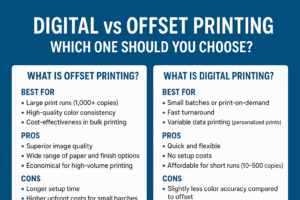When it comes to professional printing, one of the most common questions businesses and authors face is: Digital vs. Offset Printing – which one should you choose? Both methods are popular, but they serve different needs depending on your project type, budget, and timeline.

What is Offset Printing?
Offset printing is a traditional method where ink is transferred from metal plates to rollers and then onto paper. It delivers sharp, high-resolution results and is ideal for large-scale printing.
Best For:
Bulk print runs (1,000+ copies)
Consistent high-quality output
Special finishes like embossing, varnish, or foil
Pros:
Superior image quality and sharpness
Wide range of paper and finishing options
Lower cost per unit on bulk orders
Cons:
High setup costs
Longer turnaround time
What is Digital Printing?
Digital printing uses advanced machines to print directly from a digital file, without the need for plates. This makes it fast, flexible, and cost-effective for small batches.
Best For:
Small runs (10–500 copies)
Personalized prints (variable data printing)
Urgent printing needs
Pros:
Quick turnaround
Affordable for short runs
No setup cost
Cons:
Limited paper choices compared to offset
Color consistency may vary in very large orders
Digital vs. Offset Printing: How to Decide
If you want bulk printing with consistent colors, offset is the right choice. If you need small quantities, faster delivery, or personalized content, digital printing is the smarter option.
Final Thoughts
In the debate of Digital vs. Offset Printing, the “best” method depends on your project’s quantity, timeline, and customization needs. At RaiseCraft Printing Services in Hyderabad, we help you choose the perfect printing method so you get the best balance of quality and cost.
